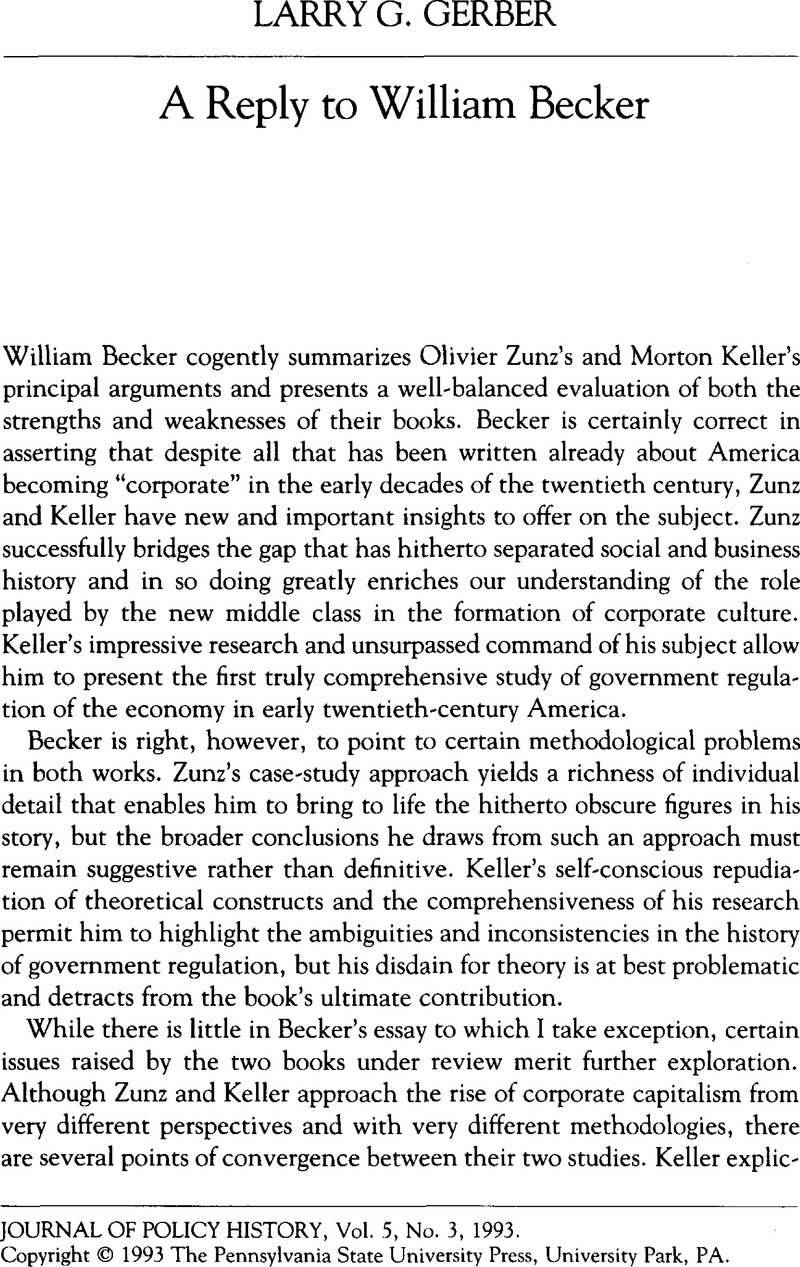No CrossRef data available.
Article contents
A Reply to William Becker
Published online by Cambridge University Press: 14 October 2011
Abstract

- Type
- Commentary
- Information
- Copyright
- Copyright © The Pennsylvania State University, University Park, PA. 1993
References
Notes
1. Mills, C. Wright, White Collar: The American Middle Classes (New York, 1953)Google Scholar; Braverman, Harry, Labor and Monopoly Capital: The Degradation of Work in the Twentieth Century (New York, 1974).Google Scholar
2. See, for example, Fox, Richard Wightman and Lears, T. J.Jackson, eds., The Culture of Consumption: Critical Essays in American History, 1880–1980 (New York, 1983)Google Scholar; and Lears, T. J Jackson, “The Concept of Cultural Hegemony: Problems and Possibilities,” American Historical Review 90 (June 1985): 567–93.CrossRefGoogle Scholar
3. Zunz, Olivier, Making America Corporate, 1870–1920 (Chicago, 1990), 195–96.Google Scholar
4. Zunz, Making America Corporate, 148.
5. Ibid., 144.
6. Keller, Morton, Regulating a New Economy: Public Policy and Economic Change in America, 1900–1933 (Cambridge, Mass., 1990), 4Google Scholar. For examples of the corporative school, see Kolko, Gabriel, The Triumph of Conservatism: A Reinterpretation of American History, 1900–1916 (Glencoe, III., 1963)Google Scholar; Ewen, Stuart, Captains of Consciousness: Advertising and the Social Roots of the Consumer Culture (New York, 1976)Google Scholar; and Noble, David F., America by Design: Science, Technology, and the Rise of Corporate Capitalism (New York, 1977).Google Scholar
7. Keller, Regulating a New Economy, 4. Representative corporate liberal works include: Sklar, Martin J., The Corporate Reconstruction of American Capitalism, 1890–1916: The Market, Law, and Politics (Cambridge, 1988);CrossRefGoogle ScholarLustig, R. Jeffrey, Corporate Liberalism: The Origins of Modern American Political Theory, 1890–1920 (Berkeley and Los Angeles, 1982)Google Scholar; Weinstein, James, The Corporate Ideal in the Liberal State, 1900–1918 (Boston, 1968).Google Scholar
8. Keller, Regulating a New Economy, 5. In addition to Wiebe, Robert H., The Search for Order, 1877–1920 (New York, 1967)Google Scholar, see Skowronek, Stephen, Building a New American State: The Expansion of National Administrative Capacities, 1877–1920 (Cambridge, 1982).CrossRefGoogle Scholar
9. Keller, Regulating a New Economy, 5.
10. Ibid., 5.
11. U.S. Department of Commerce, Bureau of the Census, Historical Statistics of the United States: Colonial Times to 1957 (Washington, D.C., 1960), 570Google Scholar; Link, Arthur S., Link, William A., and Catton, William B., American Epoch: A History of the United States Since 1900, vol. 1: An Era of Economic and Social Change, Reform, and World Wars, 1900–1945 (New York, 1987), 176.Google Scholar
12. Keller, Regulating a New Economy, 33.
13. Block, Fred, Revising State Theory: Essays in Politics and Postindustrialism (Philadelphia, 1987),Google Scholar presents a good introduction to the debate among Marxists and neo-Marxists. Much of the debate was originally inspired by Miliband, Ralph, The State in Capitalist Society: An Analysis of the Western System of Power (New York, 1969)Google Scholar; and Poulantzas, Nicos, “The Problem of the Capitalist State,” New Left Review 58 (November–December 1969): 67–78.Google Scholar
14. Keller, Robert, “Factor Income Distribution in the United States During the 1920s: A Reexamination of Fact and Theory,” Journal of Economic History 33 (March 1973): 252–73CrossRefGoogle Scholar; Lampman, Robert J., The Share of Top Wealth-Holders in National Wealth, 1922–1956 (Princeton, 1962)Google Scholar; Holt, Charles F., “Who Benefitted from the Prosperity of the Twenties?” Explorations in Economic History 14 (1977): 277–89.CrossRefGoogle Scholar
15. Keller, Regulating a New Economy, 133. For another recent work emphasizing the persistence of values and legal traditions from a different perspective, see Orren, Karen, Belated Feudalism: Labor, the Law, and Liberal Development in the United States (Cambridge, 1991).Google Scholar
16. Keller, Regulating a New Economy, 40.


